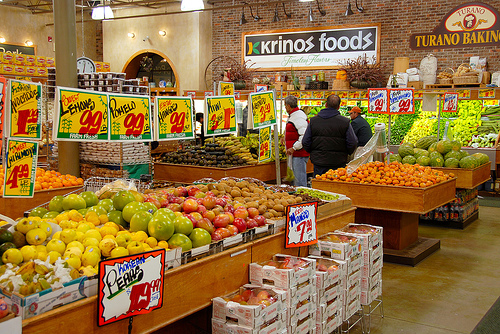
by Erica Moss
Grocery stores are designed to get you to spend as much money as possible. However, if you follow a shopping strategy, you can shop smarter and healthier while avoiding the most common grocery store traps.
Here are some proven methods for saving money on grocery store purchases:
1. Shop Fresh
Most grocery stores are laid out with the fresh food along the walls (vegetables, meat and dairy products), and frozen and processed food on the interior aisles. If you focus on buying the majority of your items from the fresh food sections, you can avoid many of the expensive and less healthy temptations along the aisles.
Another way to avoid the temptations of processed food is to buy in-season fruits and vegetables at a local farmers market. Preparing meatless meals that center on healthy fruits, grains and vegetables is another great way to eat fresh while saving money.
2. Shop for Specials
Check grocery store ads and plan shopping trips around special deals. You’ll probably find yourself shopping more often and visiting more stores, with a side benefit that you will be eating fresher food.
When you’re in the store, be wary of “specials” displayed at the end of aisles (known as end-caps in the grocery trade). These items are often being promoted at the request of the manufacturer and may not actually be on sale.
3. Think Twice About Coupons
Many coupons that are printed in magazines or mailed to your home are for expensive items that are high in unhealthy ingredients and low in nutrition.
Focusing on fresh healthy food items will save you more money than coupons for processed food.
4. Use a Shopping List
Instead of shopping for what you think you need and what you can remember that you need, take a few minutes to make a shopping list before you set off for the grocery store.
Checking your kitchen shelves and doing some meal planning can help you avoid impulse buying at the grocery store. Following a list can also cut down on return trips to the store for forgotten items.
5. Lose Your Brand Loyalty
You can save between 10 and 50 percent by switching from brand names to generic labels for many food purchases. In most cases, there is no discernible difference between the brand name and its generic equivalent.
The higher prices charged for brand names usually reflect money spent on marketing rather than a higher quality product.
6. Be Smart About Bulk Buying
Warehouse stores have created consumer enthusiasm for buying in bulk, but this practice can encourage waste if you buy more fresh food than you can eat.
Limit bulk purchases to non-perishables. Make sure to check the per-item price to ensure that a bulk purchase is really the most economical option.
One sure-fire way to save money with bulk buying is by stocking up on whole grains like rice, oats, wheat flour and flax by the pound from a natural food store.
7. Avoid Bottled Water
Twenty years ago, people probably wouldn’t have believed that, in the future, the average person would be paying exorbitant prices for bottled water on a regular basis. According to a New York Times article from 2007, most municipal water is so good that bottled water is a useless expense.
If you really don’t like your tap water, install a filter. Not only will you save hundreds of dollars per year, you’ll be protecting the environment from the huge threat of discarded plastic bottles.
8. Don’t Shop on an Empty Stomach
This tip seems obvious, but sometimes life gets in the way, and you have to rush to the grocery store after work to pick up something that can be made quickly for dinner. Upon seeing the plethora of sugary cereal, frozen pizza and ice cream in the cooler, your stomach grumbles and your sensible eating habits go out in the window, in favor of impulse buys.
Whenever possible, save grocery shopping for the weekends or during other times when you can focus on what you’re putting in your cart — instead of feeling rushed and choosing items that are instantly gratifying, but that you may regret later.
Changing your shopping habits in order to save money and eat healthier is a process that requires time and effort — but the payoff is enormous. Track your weekly grocery and dining out expenses to increase your awareness of what you’re eating and how much you’re spending. By doing some planning and increasing your shopping awareness, you’ll be surprised how much you can save.
(Erica Moss is the social media outreach coordinator for the online Masters in Nursing program at Georgetown University. Outside of work, she is passionate about community building, photography and University of Michigan football.)





